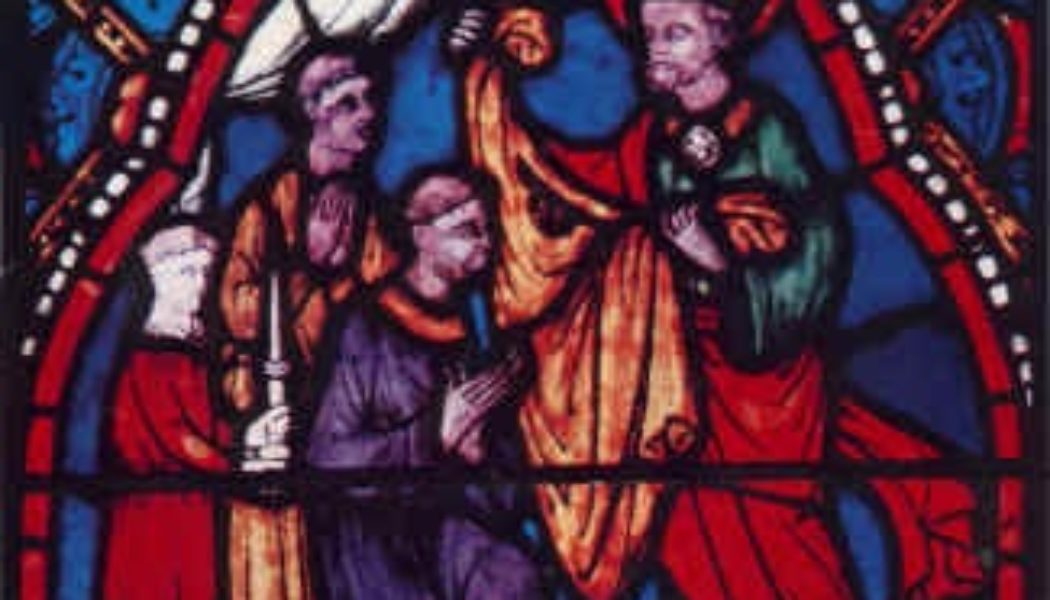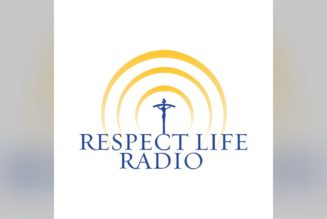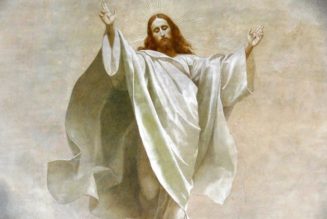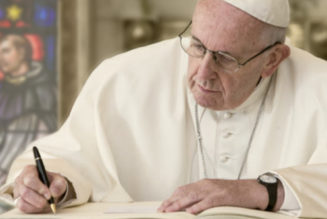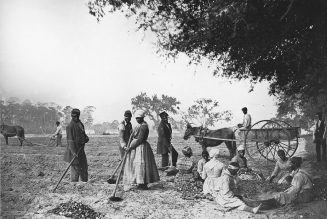Hey everybody,
Welcome to The Tuesday Pillar Post.
Today is the feast of St. Abraham of Clermont.
Born in Syria in the fifth century, Abraham was imprisoned for five years by the Persian Sassanian Empire, which at that time ruled much of the Middle East, and which had enacted a persecution against Christians in the region.
After years in chains, Abraham escaped Sassanid captivity and went west, eventually settling as a hermit in what is now central France. But eremitic life turned out not to be for him, mostly because local young men — wanting to learn how to pray — started building little huts around Abraham’s. His hermitage soon became a monastery, and he found himself an abbot.
We know any of this only because the local bishop — Sidonius Apollinaris — had an epitaph recorded on Abraham’s grave. Later St. Gregory of Tours, an historian and bishop who lived in the next century, recorded a few sentences about St. Abraham in his history of the Church Fathers.
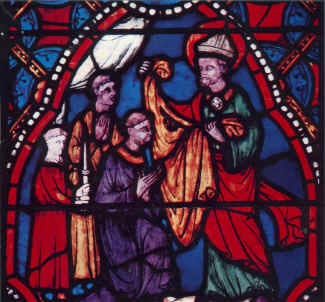
A guy who just wanted a little peace and quiet, and found himself suddenly surrounded by noisy, inquisitive, curious disciples — I have decided that this year, St. Abraham of Clermont is my official patron of fatherhood, and of Father’s Day itself.
The News
At The Pillar, we’re gearing up right now for the U.S. bishops’ conference spring virtual assembly, taking place this Wednesday – Friday on a Zoom call near you. I’ll write more about that meeting shortly. But first, here are some things we’ve been reporting about:
— On Friday, we talked with Fr. Andrew Menke, head of the USCCB’s liturgy secretariat, about the major, massive, gigantic, and time-consuming project of retranslating the Liturgy of the Hours — the set of daily prayers said by priests, deacons, religious brothers and sisters, and a growing number of lay people around the world.
Fr. Menke talked with us about the principles and history of translation and about the process of approving a translated text. He even told us when the new translation might actually be completed.
— Agnes Chow, a 24-year-old Catholic democracy activist in Hong Kong, was released from prison Saturday after serving more than six months for attending a 2019 “unlawful assembly” — a peaceful political protest opposing a law that would have allowed some Hong Kong political prisoners to be extradited to mainland China for trial.
Chow has said that her Catholicism is a motivating factor in her work for democracy in Hong Kong. Read about her story here.
— On Monday we published an interview with Gina Barthel, a Minnesota Catholic who began sharing her story of clerical sexual abuse two years ago, in the summer of 2019.
We asked Barthel what happened after she began talking about the abuse she experienced. She told us that in her personal life, there have been painful repercussions. But she also said that telling her story was worth it:
“My personal growth, my personal gain, my personal freedom, my ability to no longer live in fear and secrecy far outweighs the negative consequences. The negative consequences are still very painful — deeply painful — but they’re worth it to me.”
Barthel explained that despite an abusive and coercive relationship with a priest, she’s found healing in the Church. She said she wants that for other victim-survivors too:
“My goal from day one was not just to focus on justice — not just to focus on calling out a priest who hurt me terribly — my goal from the beginning is to say that you can be wounded in the heart of the Church and still find healing in the heart of the Church. And the people who have been wounded so deeply — I mean, terribly, terribly deeply by the Church and by its members — we need hope, and we need to know that Jesus loves us, welcomes us, and that there’s a place for us within the Church. And that healing truly is possible.”
…
“My biggest source of healing has been Eucharistic adoration.
I will say it time and time and time again: I’m leaning into Jesus in the Eucharist. That’s where I feel the most safe, it’s where I feel the most home.
That hasn’t always been the case, you know, I was away from the Church for six years because I couldn’t set foot into a Catholic church. But even now every day on my way home from work, I stop at an adoration chapel, and I just have that encounter with the Lord, and I am leaning on Jesus.”
She also had some advice for Catholics:
“Not everybody has experienced clergy abuse. That’s a very specific problem, but many people have experienced trauma. And we as a Church need to be able to know how to love, embrace, and walk with people who are currently experiencing a trauma or have experienced a trauma, and also how to prepare people for traumas that may come in the future.”
…
“I would also say that an apology goes a long way. I don’t expect the Church to always handle things perfectly, but it is reasonable to expect that when we hurt each other and/or sin against each other that we acknowledge that and say we are sorry. I’ve had to do a lot of forgiving (and apologizing for my own mistakes and sins). It’s much easier to forgive when someone is actually saying they are sorry.”
Read this whole interview. I learned a lot, and I expect you will too.
Gimme that ole time religion
This week, church leaders are gathering for a meeting that could reshape the map of Christianity in America — one that features pastors in a months-long showdown for leadership and influence, and sees believers divided sharply over matters of both internal policies and external politics, all while weekly church attendance, annual revenue, and cultural influence are on a dramatic decline.
I am talking, of course, about the 2021 meeting of the Southern Baptist Convention, taking place over the next few days in Nashville, Tennessee.
While most readers of The Pillar have their eyes on the USCCB’s spring virtual assembly, set to take place Wednesday through Friday of this week, an equally significant story about religion in America is unfolding in Nashville among Southern Baptists, who now constitute America’s largest Protestant denomination, with more than 14 million members and some 5 million(ish) weekly churchgoers— at least before the pandemic.
There are at least three viable candidates running in Nashville for the presidency of the Southern Baptist Convention, and their candidacies are split over the denomination’s views on critical race theory and on a broader set of racial tensions within the SBC, as well as on a broiling fight over how allegations of ministerial sexual abuse in the denomination should be handled.
Amid those fights, factions have begun to gel into parties and coalitions, and social media has amplified a set of serious disagreements inside the convention hall, including reports that minister Mike Stone, widely considered a top-tier presidential candidate, had sharp words for an abuse survivor who has become an organizer and advocate at the Nashville meeting.
Some of this will sound familiar to Catholics, as we are well accustomed to the intrigue and rancor of ecclesiastical politics. But some of it, especially the more democratic elements of the whole affair, are foreign to our ways of “being Church.” (There is, by the way, likely no phrase more politically revealing and divisive among Catholic ecclesiastics than the grammatically exasperating notion of being – absent any kind of article or modifier – Church.)
I’ve spent a couple of hours reading about the politics of the SBC, and talking with Southern-Baptist-and-adjacent friends, and the most I can say is that the narrative is more theologically nuanced and multifarious than most reporting about the convention would have you believe.
Media reports that would shape the SBC’s complex situation into the antipodes of “left” and “right” are missing precisely the dynamics that make the situation interesting and explosive: That those traditionally on the denomination’s “left” are finding common cause on race among some with whom they disagree fervently on near everything else, while those inside the SBC’s “right” have been fractured into camps seemingly defined by their ecclesiological convictions and the implications of those convictions on the handling of sexual abuse allegations — even while not everyone is convinced that purely theological motives are driving practical positions.
It is, in short, the kind of situation that only a practiced and long-observant Southern Baptist watcher could fully sum up, and as a consequence, most of us are getting only a very obscured view of the reality.
And that brings me to the USCCB.
The bishops will have a discussion this week about whether their doctrine committee should draft a document on “Eucharistic coherence,” — a document that would, at least according to USCCB president Archbishop Jose Gomez, offer a broad set of teachings on the meaning of the Eucharist and its role in the life of the Church.
The document — should the bishops vote to write one — would most certainly make mention of the fact that politicians and other public figures who take positions at odds with doctrine should not receive Holy Communion. But I’ve mentioned before that while some bishops would like to be more specific, and emphasize the power of the diocesan bishop to be more restrictive, it was never plausible that the document would be a full-throated call for bishops to prohibit politicians supporting abortion access and funding, or any other political position, from Holy Communion.
Why not? The idea for the document began with a committee on the Catholic Biden administration, and the question of pro-abortion politicians is central, but few bishops want to seem to be telling their brothers what to do. And even among those who have spoken most vehemently about “Eucharistic coherence,” there has never been an appetite to suggest that the USCCB could set policy on the question, especially since it can’t.
Instead, most bishops speaking in favor of the document have framed the issue of “Eucharistic coherence” as an exhortation that folks advocating against Catholic doctrine should take it upon themselves to refrain from Holy Communion, and been content to leave it at that.
Whatever statement the doctrine committee might draft, it will probably look most like the USCCB’s 2006 treatment of the same subject, or the 2007 statement of Latin American bishops on the issue, and not at all like the “ban on Bidens” at the communion rail that many news reports have seemed to anticipate.
But like the SBC, the complexities of the USCCB’s machinations on this subject require a somewhat nuanced and historically informed understanding of the theological, sociological, and political dynamics inside the American episcopate. Still, most reporting seems content to frame the whole things as left vs right, crypto-Republicans vs. Biden-allies, or Vatican vs. culture warriors, and call it a day before the Zoom meeting really gets underway.
In truth, the Eucharistic coherence document is only now framed as radical because of how hard the document’s opponents have pushed to avoid it. Without the opposition voice, the final document’s position on “Eucharistic coherence” would have actually drawn criticism from a whole cadre of Catholics complaining it was too vague, too “soft,” and too “pastoral.”
(Actually, it probably still will draw that criticism).
But the bishops on both sides of this debate have made tactical choices that have given fodder to a media frenzy that largely misunderstands the debate and the consequences.
On the other hand, the decision to give a half-hour interview on the document to Michael Voris, an inflammatory, grandiose, and conspiracy-minded provocateur whose material has been criticized as “racist and derogatory” by Archbishop Alan Vigneron, feeds the criticism that the supporters of the “Eucharistic coherence” document are acting outside the ecclesiastical mainstream.
Those choices will probably be discussed in a heated closed-door conversation among the bishops during their meeting’s executive session. But in the public session, it seems likely the plan to draft the document, itself only a first step in a long process, will pass a vote among the bishops this week.
While the outcome is unlikely to surprise, how the bishops discuss Eucharistic coherence among themselves actually still matters.
Sure, no matter what happens, some media outlets will continue to frame the whole things as a kind of episcopal Royal Rumble, with increasingly improbable reports emerging about the climate in the Vatican and among the bishops.
The situation — and the acrimonious rift it has exposed and exacerbated — is serious enough as it actually is. There is little need for media reports aiming to depart from reality for clicks.
And for bishops, there is an opportunity. Those bishops who choose to engage each other wisely, attentively, and prudently, listening with charity and speaking the truth with conviction, might prove to actually want a discernment — just like Pope Francis has encouraged — rather than the melee that media is expecting.
Bishops who seem directive, aloof, and indifferent to the perspectives of their brethren, on the other hand, will have a much harder time claiming that they’ve taken the guidance of the Vatican on this discussion seriously, or that they’re willing to engage in the kind of consensus-seeking on this issue which the Church has called for, and that many Catholics will be watching for.
‘We are greatly blessed’
Sunday is Father’s Day, I learned yesterday, when it was mentioned to me by both my son and my father.
I’ve been reflecting a little bit on fatherhood and sonship. My dad is a great and consistent blessing in my life. Of course, in the manner of most fathers, I’m not sure he always sees that; he has etched in his mind the failures, without appreciating the context and backdrop of the successes. But my dad is a witness to a reflexive and self-giving love for the poor, a category which, in one way or another, has often included me.
My wife pointed out to me yesterday that my dad’s charity is a habit, a disposition, really, rather than something which seems to check a box or be imposed. And I think the reason is that my father has long cultivated a disposition of gratitude, which begets and fosters charity.
My dad has a phrase he repeats so often it’s something of a family joke: “We are greatly blessed,” my dad says, at family birthday parties or Sunday night cards games. We tease him by trying to say it first. I used to think my dad said this because he was already grateful, but lately I’ve realized he said it to become grateful — that it became a kind of tempering reminder for himself, amid the ordinary frustrations and demands of family life.
My dad, I’ve realized, reminds himself that the Lord has blessed us mostly so that he can put himself aside, and bless us too.
Readers of this newsletter know that the Flynns have faced some challenges with our children lately — one of them is that my son Max has some neurological conditions which demand more patience from us than I usually have, and, frankly, I’ve worried that the other kids might come to resent the extra attention and flexibility those conditions require.
But anxiety about what I can’t control in their lives is a hardly a solid footing from which to teach my children how to trust in the goodness of God’s providential fatherhood. I’m reminded this Father’s Day how much my father’s little adage has set the tone for my life. And I’m reminded that gratitude — especially filial piety to our Father in heaven — is the best possible gift I can give to my own children.
Gratitude — the recognition that we have already been blessed — also orients us to better see the ways in which we continue to be blessed.
So it’s time for me to take up the mantle of my father’s legacy, and let my children mock me if they must, for the frequent repetition of a phrase I hope to plant deeply in their hearts: “We are” —indeed — “greatly blessed.”
Thanks Dad.
End notes
—Starting tomorrow, we’ll be covering in full the events of this week’s USCCB meeting as thoroughly as we can. We’ll have stories and analysis at our site, and, since it has become my custom, I’ll also be live-tweeting all the public sessions of the meeting. (If you don’t regularly use Twitter, we’ll post all the live-tweeted threads here for your convenience. And for posterity.) You can also subscribe to The Pillar Podcast wherever you get your podcasts, and you’ll hear a podcast USCCB update from us late this week.
While most attention at the USCCB meeting will focus on Eucharistic teaching, equally important will be a presentation on Eucharistic living — a presentation on a “Eucharistic Revival” initiative being planned now at the conference. If you don’t want to miss any part of it, stick with The Pillar, and we’ll bring you an informed, sane take on what you need to know.
—My kids are making the best possible use of their summer vacation this year by watching on YouTube far more “pancake art” creation than I would prefer — except, I must admit, it actually is kind of cool to watch.
—Here’s an interesting account of the clash between traditional European circus families and the animal rights activists who oppose them — told in the story of an elephant, and the family who snuck her across Europe.
—And speaking of Europe, games continue in the group play of EuroCup 2021, while soccer fans hold their breath ov— just kidding. No one cares about soccer.
— Thanks to all of you who responded to Ed’s invitation last week to consider subscribing to The Pillar. So many of you responded that I won’t repeat that call, at least not for a couple of weeks, but we are grateful for those of you who consider our work worth paying for, and who have made the effort to pay for it. We’re also grateful to those of you who share these Pillar Posts, helping us reach new readers, and grow our project.
Thank you. We’re grateful, and we’re praying for you.
As always, please be assured of our prayers, and please continue praying for us. And let’s all pray this week for unity in our Church, and more broadly for Christian unity throughout the world. Our Father desires that his children would be one, united in the communion of his Son, and in the unity of the Church.
In Christ,
JD Flynn
editor-in-chief
The Pillar
Join Our Telegram Group : Salvation & Prosperity
